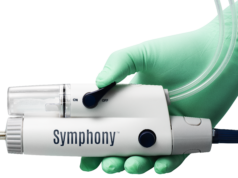
Boehringer Ingelheim has announced results from the RE-COVER II study evaluating dabigatran compared to warfarin in patients diagnosed with acute deep vein thrombosis and/or pulmonary embolism. In this phase III study, published online in the American Heart Association’s journal Circulation, dabigatran met the primary endpoint of non-inferiority to warfarin for recurrent, symptomatic, objectively-confirmed deep vein thrombosis and/or pulmonary embolism and related deaths during six months of treatment.
RE-COVER II also showed that dabigatran was associated with a 31% reduction in the risk of major bleeding (15 dabigatran patients vs. 22 warfarin patients), which did not reach statistical significance. Additionally, the study demonstrated significantly less overall bleeding (33% reduced risk; 200 dabigatran vs. 285 warfarin patients) and major or clinically relevant non-major bleeding (38% reduced risk; 64 dabigatran vs. 102 warfarin patients).
A pooled analysis of data from both RE-COVER II and a similar trial, RE-COVER, showed comparable results.
“RE-COVER II was initiated to confirm findings from a similar trial, RE-COVER. Both trials showed an overall low rate of recurrent deep vein thrombosis and/or pulmonary embolism in both the dabigatran and warfarin treatment arms,” said Sam Schulman, lead study author and professor, Department of Medicine, McMaster University, Ontario, Canada. “RE-COVER II will allow for more thorough subgroup analyses as a result of a patient population with a wider spectrum of ethnicities.”
RE-COVER II was a randomised, double-blind, double-dummy study in 2,589 patients with acute symptomatic deep vein thrombosis and/or pulmonary embolism recruited at 208 study sites in 31 countries. The trial was designed to determine if dabigatran 150mg twice daily is non-inferior to warfarin for the primary endpoint of preventing a recurrence of deep vein thrombosis and/or pulmonary embolism and related deaths, and to compare the safety of the two drug regimens during six months of treatment. In the trial, patients were treated with either dabigatran or warfarin after initial parenteral anticoagulation therapy (approximately nine to 10 days). Patients in the warfarin group had their doses adjusted to maintain an international normalized ratio (INR) of 2.0–3.0.
The efficacy analysis included 2,568 patients randomly assigned to the treatment groups. All patients analysed received at least one dose of the study drug (1,279 in the dabigatran group and 1,289 in the warfarin group). The analysis showed that dabigatran was non-inferior to warfarin for the prevention of recurrent or fatal deep vein thrombosis and/or pulmonary embolism (p<0.001 for both hazard ratios and difference in absolute risk criteria). Specifically, recurrent nonfatal or fatal deep vein thrombosis and/or pulmonary embolism was confirmed after central adjudication in 30 patients in the dabigatran group (2.3%) and in 28 patients (2.2%) in the warfarin group (hazard ratio, 1.08; 95% CI, 0.64 to 1.80).
The safety analysis included 2,568 patients and was performed according to the treatment received (1,280 in the dabigatran group and 1,288 in the warfarin group). The safety findings were:
- Major bleeding occurred in 1.2% (15) of dabigatran patients and 1.7% (22) of warfarin patients (HR 0.69, 95% CI 0.36 to 1.32).
- Overall (any) bleeding occurred in significantly fewer patients in the dabigatran group compared to the warfarin group: 15.6% (200) vs. 22.1% (285), respectively (HR 0.67, 95% CI, 0.56 to 0.81).
- Major or clinically relevant non-major bleeding also occurred in significantly fewer dabigatran than warfarin patients: 5% (64) vs.7.9% (102), respectively (HR 0.62, 95% CI, 0.45 to 0.84).
- The overall rate of deaths and adverse events were similar in both groups, with the exception of dyspepsia, which was more common in the dabigatran group (1%) than in the warfarin group (0.2%).
- The incidence of acute coronary syndrome was numerically higher with dabigatran than with warfarin (absolute risk increase of 0.1%).
“Boehringer Ingelheim is pleased with the results from RE-COVER II and is committed to addressing the complex medical need of patients with deep vein thrombosis and/or pulmonary embolism,” said Sabine Luik, senior vice president, Medicine & Regulatory Affairs, US regional medical director, Boehringer Ingelheim Pharmaceuticals. “Based on these studies and other dabigatran research conducted in deep vein thrombosis/pulmonary embolism, the FDA accepted for review a supplemental new drug application (sNDA) for Pradaxa for its use in patients with deep vein thrombosis and pulmonary embolism.”
A pooled analysis of RE-COVER II and RE-COVER demonstrated similar results to RE-COVER II. The combined studies randomised 5,107 patients who were all initially treated with parenteral anticoagulation therapy followed by warfarin or dabigatran. The hazard ratio for recurrent deep vein thrombosis and/or pulmonary embolism or related death for dabigatran compared to warfarin was 1.09 (95% CI, 0.76 to 1.57). The pooled analysis also showed lower rates of bleeding with dabigatran. The hazard ratio for major bleeding, with dabigatran compared to warfarin, was 0.73 (95% CI, 0.48 to 1.11); for any bleeding, 0.70 (95% CI, 0.61 to 0.79); and for major or clinically relevant non-major bleeding, 0.62 (95% CI, 0.50 to 0.76). Although RE-COVER and RE-COVER II individually showed a non-significant reduction in major bleeding with dabigatran, the reduction was statistically significant in the pooled analysis during the period following discontinuation of parenteral anticoagulation (i.e., during the double-dummy period): HR 0.60, 95% CI, 0.36 to 0.99. Acute coronary syndrome occurred more with dabigatran (9 patients, 0.4%) than with warfarin (5 patients, 0.2%).
Dabigatran is currently marketed as Pradaxa (dabigatran etexilate mesylate) in the United States to reduce the risk of stroke and systemic embolism in patients with non-valvular atrial fibrillation; dabigatran is currently not approved by the FDA to treat deep vein thrombosis and/or pulmonary embolism.












